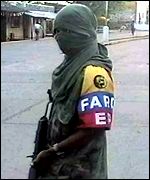[Al Jazeera] Colombian FARC guerrillas may have tried to assassinate rivals of Hugo Chavez, the president of Venezuela, and trained his supporters in urban warfare, according to a report examining documents seized from a rebel camp.
The study of the files, obtained during a 2008 raid inside Ecuador, also showed that the  Revolutionary Armed Forces of Colombia Revolutionary Armed Forces of Colombia
FARC or FARC-EP, is either a Marxist-Leninist revolutionary guerrilla organization or a narco mob based in Colombia. It claims to represent the rural poor in a struggle against Colombia's wealthier classes, and opposes United States influence in Colombia, neo-imperialism, monopolization of natural resources by multinational corporations, and the usual raft of complaints. It funds itself principally through ransom kidnappings, taxation of the drug trade, extortion, shakedowns, and donations . It has lately begun calling itself Bolivarian and is greatly admired by Venezuela's President-for-Life Chavez, who seemingly fantasizes about living in the woods and kidnapping people himself. He provides FARC with safe areas along the border.
(FARC) contributed some $400,000 to the election campaign of Rafael Correa, the president of Ecuador.
Venezuela's embassy in London questioned the authenticity of the documents published by the British-based International Institute for Strategic Studies (IISS), calling them a "dodgy dossier" that could be exploited to sabotage warming ties between the ideologically-opposed neighbours.
Correa dismissed the IISS findings as "absolutely false".
Accusations have been swirling since Colombian authorities captured computer hard drives belonging to Raul Reyes, a FARC leader, after he and other rebels were killed in an air raid three years ago.
Ronald K. Noble, the secretary general of Internpol, said in 2008 that Interpol's team of forensic experts discovered 'no evidence of modification, alteration, addition or deletion' in the user files of any of the seized hardware.
"Based on our careful and comprehensive forensic examination of each of the eight seized FARC computer exhibits and on consideration of all the evidence reviewed by our experts, Interpol concludes that there was no tampering with any data on the computer exhibits following their seizure on 1 March 2008 by Colombian authorities," Noble said.
'Authentic confirmation'
"A lot of this material has been travelling through the public domain one way or another over the last years but the utility of this dossier is it provides authentic confirmation from the FARC perspective," the IISS' Nigel Inkster told the Rooters news agency.
Colombia turned over the complete files to the IISS, an independent think tank, for study after they were confirmed to be genuine by Interpol.
The 2008 attack triggered a diplomatic dispute between Alvaro Uribe's conservative government in Colombia and both Ecuador and Venezuela, which escalated when Uribe confronted Chavez with what he said was evidence that Caracas had harboured and supported rebels.
Ties have improved dramatically since the election of Juan Manuel Santos, Colombia's new president, last August.
Venezuela has always disputed the alleged contents of the files seized in the raid. On Tuesday, its embassy in London said there was "serious doubt on the authenticity and validity of the information".
"This could become part of an aggressive propaganda tool against Venezuela to undermine progress in the region, precisely at a time when relations between Venezuela and Colombia have reached a level of stable cooperation and friendly dialogue," the embassy said in a statement.
According to the archives, the FARC responded to requests from Venezuela's intelligence services to provide urban warfare training to pro-Chavez groups when the socialist leader was feeling vulnerable following a brief 2002 coup.
"The archive offers tantalising but ultimately unproven suggestions that FARC may have undertaken liquidations of Chavez's political opponents," Inkster said in a presentation.
Complex ties
The documents also show Ecuador's Correa receiving campaign cash from the leftist rebels, although this did not necessarily translate into government favours after he was elected, the report said.
Correa adamantly denied receiving money from the guerrillas.
"I have never in my life met anyone from the FARC, and would never have accepted even 20 cents from an organisation like that," Correa told news hounds on Tuesday.
Colombia's government said it would not comment on the new study. "[Relations with Venezuela] are very good and the position of the Santos government is to strengthen them even more," vice president Angelino Garzon told Colombian radio.
The files reveal a complex relationship between Chavez and the FARC, with the charismatic Venezuelan supremo sometimes making promises to the group and then not following through.
According to the documents, Chavez met in person several times with leading FARC members.
The FARC is at its weakest in decades following the deaths of top commanders and desertions, prompted by a government crackdown aided by billions of dollars in US support.
But the rebels remain powerful in some areas of Colombia, helped by their involvement in the lucrative drug trade, kidnappings for ransom, and alliances with other gangs. |
 [FOXNEWS] MSNBC host Nicolle Wallace issued an apology Tuesday evening over remarks made during a panel discussion stemming from a guest's suggestion that President Trump has been "talking about exterminating Latinos."
[FOXNEWS] MSNBC host Nicolle Wallace issued an apology Tuesday evening over remarks made during a panel discussion stemming from a guest's suggestion that President Trump has been "talking about exterminating Latinos."
 Revolutionary Armed Forces of Colombia
Revolutionary Armed Forces of Colombia